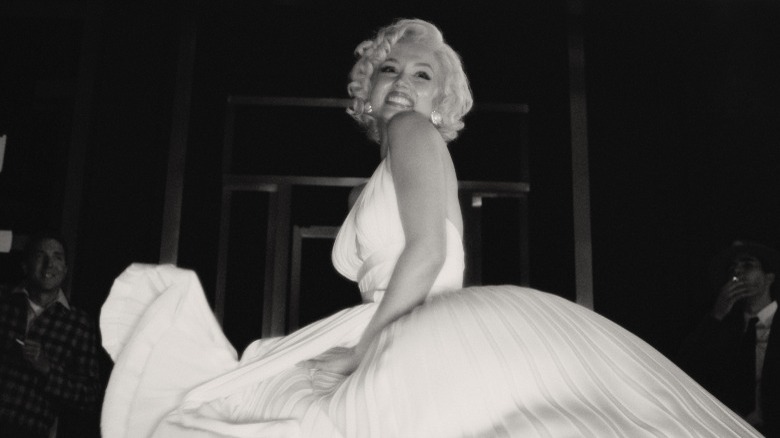Why Blonde Ends The Way It Does According To Andrew Dominik
Netflix's "Blonde" is a movie that was designed to offend, which is something that director Andrew Dominik took great pride in when promoting the NC-17 movie, which is based on author Joyce Carol Oates' fictionalized account of Marilyn Monroe's life. "We're in a time now, I think, where people are really uncertain about where any lines are," he told Vulture in May 2022. "It's a film that definitely has a morality about it. But it swims in very ambiguous waters because I don't think it will be as cut-and-dried as people want to see it," the filmmaker said. "There's something in it to offend everyone." Despite its many controversies, though, there's one very important thing about the movie and its story that surprisingly doesn't go against the grain: Its ending.
During the closing moments of "Blonde," we see Ana de Armas portraying a distraught and emotionally unstable Monroe, who has just found out that she's been manipulated and tricked by her former lover Cass (Xavier Samuel) into believing that she had been getting letters from her father for years. In reality, it was Cass who was sending the heartfelt mementos, which ultimately caused Monroe to have an intense mental breakdown. With her addiction problems bearing down on her, Armas' Monroe winds up overdosing on barbiturates in the film's final scenes, and viewers are shown her last dying moments in bed.
Shockingly, Dominik chooses to go the historical route with "Blonde" and Monroe's death, despite many people speculating beforehand that he would possibly play up the conspiracies surrounding the Hollywood starlet's demise, including claims that she was killed to hide her relationship with President John F. Kennedy. Apparently, Dominik had a very simple reason for avoiding the conspiracy theories.
Dominik believes it wouldn't make sense to involve conspiracy theories
According to Andrew Dominik, the main reason he chose to avoid reimagining Marilyn Monroe's death was because he just doesn't believe anything else could have happened to the movie vixen other than a self-inflicted overdose.
"I don't believe that she was murdered," Dominik told TheWrap in a September 2022 interview. "It doesn't make any f***ing sense," he said. "There is no reason to murder her, because if she'd held a press conference and said that she'd had affairs with the Kennedys, no one would have reported it. I mean she could have literally called a press conference, and no one would have written down what she said. So it makes no sense to kill her." People have debated for years whether Monroe — whose last movie appearance came in 1961's "The Misfits" — purposely overdosed or accidentally did so in a fit of rage or sadness. Dominik ultimately views her death as an accidental suicide, which is the common belief among experts.
"I mean, she was obviously an addict," he told TheWrap. "I think she probably died of an accidental overdose, you know, which is most common thing in the world for an addict. But I also think an accidental overdose is a form of suicide. You know, it's sort of a left-handed form of suicide but the right hand doesn't know what the left hand is doing." Dominik added that he pushed this narrative firmly while making "Blonde" because he believes Monroe was a self-destructive individual and that most people probably won't debate that.
If you or anyone you know is having suicidal thoughts, please call the National Suicide Prevention Lifeline by dialing 988 or by calling 1-800-273-TALK (8255).

